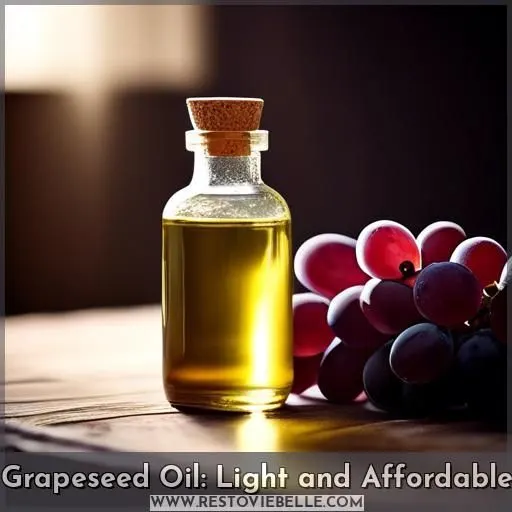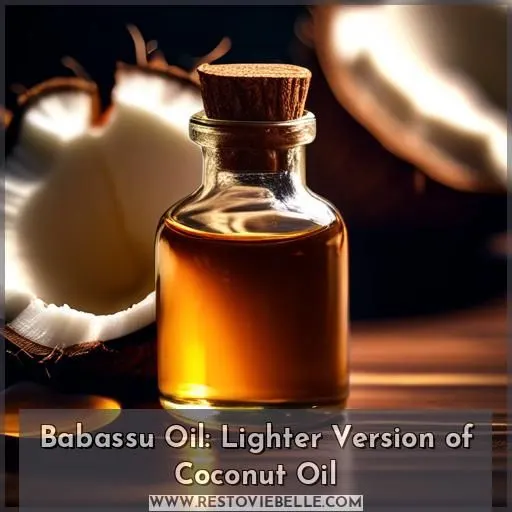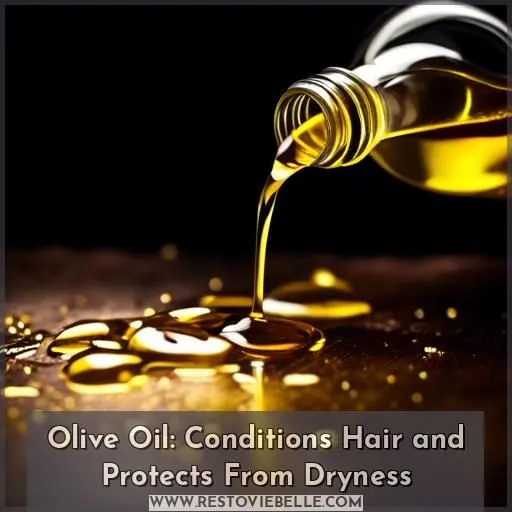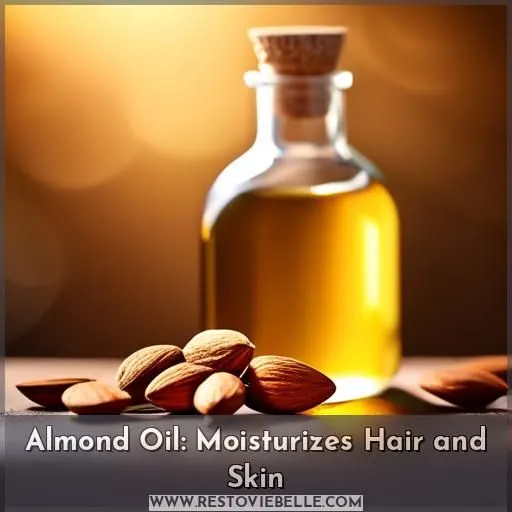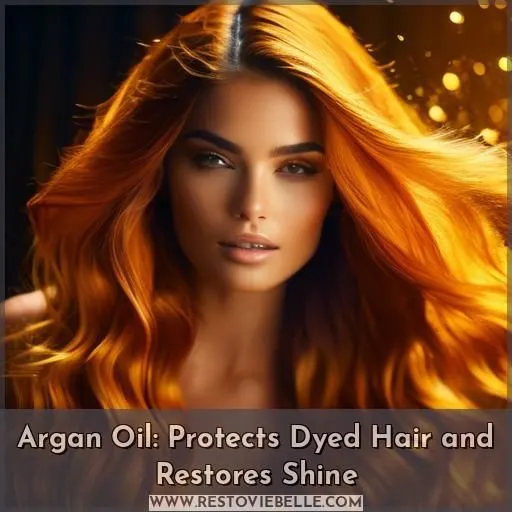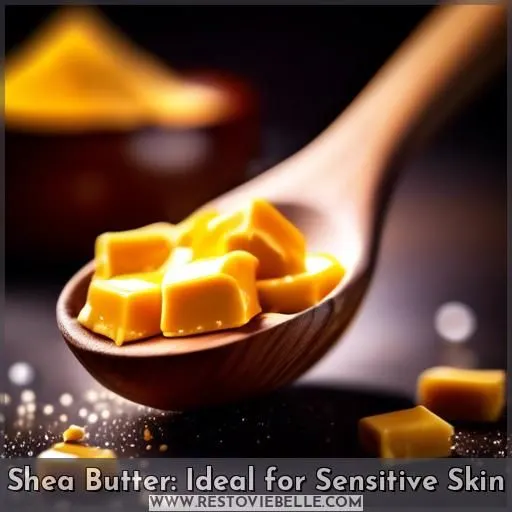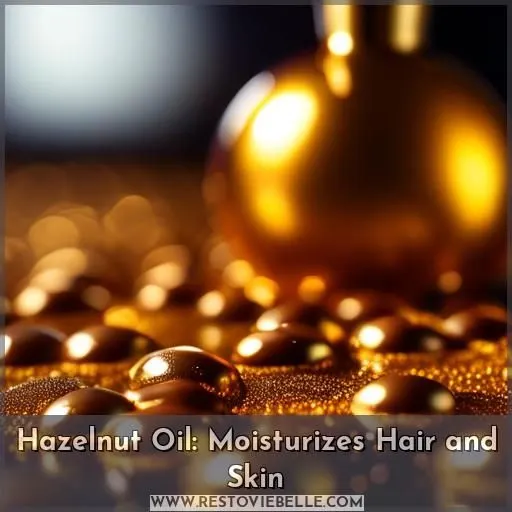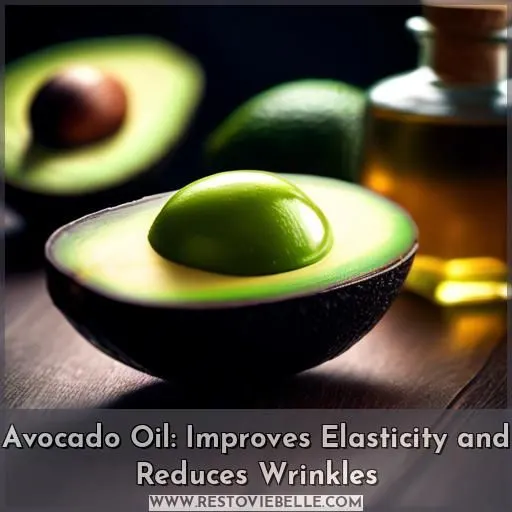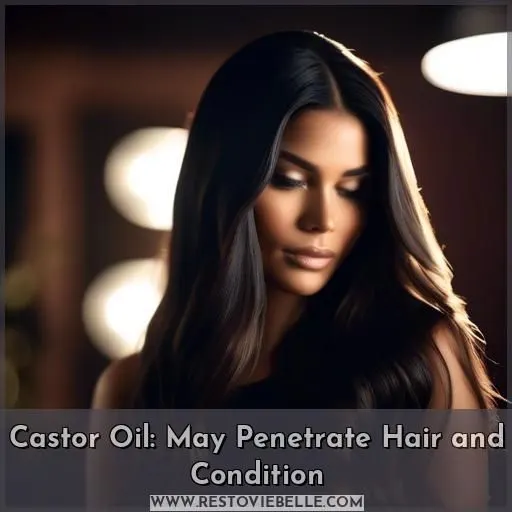This site is supported by our readers. We may earn a commission, at no cost to you, if you purchase through links.
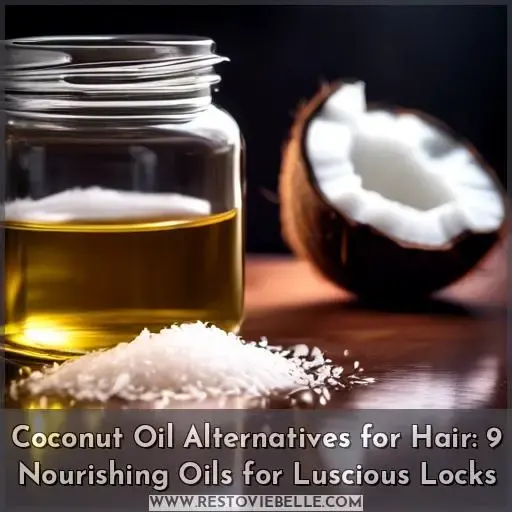
If you’re seeking coconut oil replacements that can bestow similar benefits on your hair sans the oiliness, there are various prospects to contemplate. Grapeseed oil is a lightweight and economical pick, whereas babassu oil constitutes a more refined iteration of coconut oil.
Olive oil nourishes hair and shields it from aridity. Almond oil hydrates hair and integument. Argan oil safeguards dyed hair and rejuvenates its luster.
Shea butter proves ideal for delicate skin. Hazelnut oil moisturizes hair and integument. Avocado oil augments elasticity and diminishes wrinkles.
Ultimately, castor oil has the capacity to permeate hair and condition it. These alternatives address diverse hair types and requirements, empowering you to select the one that optimally aligns with your hair’s needs.
Table Of Contents
- Key Takeaways
- Grapeseed Oil: Light and Affordable
- Babassu Oil: Lighter Version of Coconut Oil
- Olive Oil: Conditions Hair and Protects From Dryness
- Almond Oil: Moisturizes Hair and Skin
- Argan Oil: Protects Dyed Hair and Restores Shine
- Shea Butter: Ideal for Sensitive Skin
- Hazelnut Oil: Moisturizes Hair and Skin
- Avocado Oil: Improves Elasticity and Reduces Wrinkles
- Castor Oil: May Penetrate Hair and Condition
- Frequently Asked Questions (FAQs)
- Conclusion
Key Takeaways
- Grapeseed oil is a lightweight and affordable alternative to coconut oil for hair care, offering a non-greasy, deep conditioning treatment.
- Babassu oil is a lightweight, non-greasy oil derived from the nuts of the babassu palm tree, rich in fatty acids that penetrate the hair shaft, providing deep hydration and nourishment.
- Olive oil is a great natural remedy for dry hair, offering deep conditioning benefits that leave your locks feeling nourished and hydrated.
- Almond oil is a natural hair and skin moisturizer, lightweight and perfect for dry skin, as it can penetrate the hair shaft, repairing damage and reducing protein loss.
Grapeseed Oil: Light and Affordable
Grapeseed oil is your go-to for a light, affordable alternative to coconut oil.
This unsung hero of natural oils doesn’t just play second fiddle; it’s a star in its own right.
Perfect for those who want to keep their hair care routine as light as their wallet, grapeseed oil offers a non-greasy, deep conditioning treatment that won’t weigh down your locks.
Plus, it doubles as a gentle makeup remover, whisking away the day’s facade with ease.
So, if you’re looking to break free from coconut oil’s grasp and give your hair a rejuvenating experience, grapeseed oil might just be your hair’s new best friend.
Babassu Oil: Lighter Version of Coconut Oil
Babassu oil is a lightweight, non-greasy oil that can be a great alternative to coconut oil for hair care. Derived from the nuts of the babassu palm tree, babassu oil is rich in fatty acids like lauric and myristic acid, which penetrate the hair shaft, providing deep hydration and nourishment. It’s suitable for all hair types, including fine or oily hair, as it provides hydration and shine without weighing the hair down. Babassu oil also contains vitamin E and other antioxidants, which help the scalp and hair repair damage.
To incorporate babassu oil into your hair care routine, you can use it as a pre-shampoo treatment, applying it to damp hair before shampooing. It can also be used as a leave-in conditioner for thick or dry/damaged hair. You can add a few drops of babassu oil to your shampoo or conditioner for added hydration and shine. For a deep conditioning hair mask, mix babassu oil with other natural oils like jojoba oil and apply it to your hair before shampooing. Remember to use high-quality, cold-pressed, and organic babassu oil to preserve its therapeutic characteristics.
Olive Oil: Conditions Hair and Protects From Dryness
Olive oil is a fantastic natural remedy for dry hair, offering deep conditioning benefits that leave your locks feeling nourished and hydrated.
This versatile oil can be used as a leave-in treatment or added to your favorite conditioner for an extra moisture boost.
For those with frizz-prone hair, olive oil can help tame flyaways and reduce static.
Additionally, its monounsaturated fats penetrate deep into hair fibers, providing protection from weather-related dryness.
To use olive oil as a hair treatment, simply apply a small amount to the ends of damp hair before styling or heat and massage it into your hair for 30 minutes before shampooing.
For a more luxurious experience, try using it as a pre-shampoo treatment for fine hair or a leave-in treatment for thick or damaged hair.
Almond Oil: Moisturizes Hair and Skin
If you’re looking for a natural hair and skin moisturizer, almond oil is a fantastic choice.
It’s not just great for your hair, but it also works wonders on your skin.
Imagine stepping out of the shower, your hair feeling like a dried-up straw mane, and your skin as dry as the Sahara. With almond oil, you can say goodbye to those problems.
It’s a lightweight oil that can penetrate your hair shaft, repairing damage and reducing protein loss.
It’s also perfect for dry skin, as it can help soothe and restore moisture.
So, whether you’re looking for a hair conditioner or a skin moisturizer, almond oil has got you covered.
Just remember to use it sparingly to avoid any oiliness.
Argan Oil: Protects Dyed Hair and Restores Shine
Argan oil is a must-have in your hair care routine, especially if you’re looking for a coconut oil alternative. This oil, derived from the kernels of a Moroccan tree, is packed with essential fatty acids that condition your hair and protect it from oxidative dye damage. It’s perfect for those with dyed hair, as it helps to restore the natural shine and luster your hair may have lost.
But argan oil isn’t just about shine. It also nourishes your hair, helping to repair damage and promote hair growth. And if you’re concerned about scalp health, argan oil can help with that too, reducing redness and inflammation.
Shea Butter: Ideal for Sensitive Skin
Moving from the vibrant world of argan oil, let’s venture into the soothing embrace of shea butter, your go-to ally for sensitive skin.
Imagine shea butter as a gentle giant, offering eczema relief and psoriasis treatment without harshness.
It’s like a soft whisper against skin irritation, making it a staple in scalp care.
Ever thought of shea butter as a shaving cream? It’s a game-changer, providing a smooth glide without fuss.
And for those makeup-heavy days, it doubles as a gentle makeup remover.
Consider it your skin’s best friend, doubling as an eczema cream and lip balm.
Shea butter isn’t just about skin care; it’s about giving your skin the freedom to breathe and thrive, minus the irritation.
Hazelnut Oil: Moisturizes Hair and Skin
Hazelnut oil is a fantastic coconut oil alternative for those seeking to moisturize their hair and skin. This versatile oil is lightweight and absorbs quickly, making it perfect for those with fine or oily hair. It’s rich in vitamin E, which helps protect your hair from damage and promotes hair growth. The protein content in hazelnut oil also aids in maintaining scalp health, reducing dryness, and preventing dandruff.
For those with scalp psoriasis, hazelnut oil can provide relief by calming itch and irritation, reducing redness and inflammation. It’s also a great choice for those with sensitive skin, as it’s gentle and non-irritating.
In addition to its hair benefits, hazelnut oil is also a popular choice for skincare, as it’s rich in antioxidants and can help reduce the appearance of wrinkles. So, whether you’re looking for a new hair oil or a skincare addition, hazelnut oil is a nourishing choice that won’t leave you feeling weighed down.
Avocado Oil: Improves Elasticity and Reduces Wrinkles
Avocado oil is a powerhouse for hair health, offering a plethora of moisturizing benefits that can fortify your locks and elevate your beauty regimen. This oil teems with fatty acids, vitamins, and minerals that synergistically enhance elasticity, diminish wrinkles, and safeguard your hair from damage.
By incorporating avocado oil into your hair care routine, you aren’t just nourishing your hair but also fostering scalp health. The anti-aging attributes of this oil can aid in stimulating hair growth, rendering it a valuable asset to your pre-poo treatments.
Whether you seek to curtail frizz, shield your hair from heat damage, or simply amplify your comprehensive hair care routine, avocado oil is a versatile and efficacious choice. Additionally, don’t overlook its efficacy for oral hygiene – attempt oil pulling with avocado oil for a profound clean and invigorating breath.
Castor Oil: May Penetrate Hair and Condition
Immerse yourself in the realm of castor oil, a formidable ally for your hair that transcends mere versatility. This viscous, amber liquid holds the key to opulent tresses, serving as a valiant protector for scalp well-being and hair elongation. Let’s unravel why it merits a prominent place in your hair care regime:
- Scalp Savior: Castor oil’s anti-inflammatory virtues alleviate scalp discomfort, bidding farewell to irritation.
- Growth Guru: It acts as a catalyst for hair growth, urging those strands to attain unprecedented lengths.
- Germ Fighter: With its antibacterial prowess, it repels scalp infections, establishing a pristine foundation for healthy hair.
- Moisture Maestro: It seals in hydration, leaving your hair with an ethereal, salon-like softness.
Frequently Asked Questions (FAQs)
Can coconut oil be used as a face cleanser?
Yes, coconut oil can be used as a face cleanser. It’s effective at removing dirt and impurities, and it can also be used as a makeup remover. To use coconut oil as a cleanser, warm a small amount between your hands until it becomes liquid, then spread it over your face and allow it to absorb for a few moments before wiping it off with a warm wet cloth.
Is olive oil suitable for all hair types?
Absolutely, olive oil is suitable for all hair types. It’s packed with fatty acids, antioxidants, and nutrients that can condition, soften, and repair damaged hair strands. Its moisturizing, smoothing, and strengthening properties** make it a great choice for those with dry, dull, and frizzy hair.
Additionally, olive oil contains oleic acid and squalene, which help seal moisture into the hair, and vitamin E, which acts as a smoothing agent. It’s also rich in antioxidants like oleuropein, which can promote hair growth in mice studies.
However, it’s important to use olive oil in moderation to avoid overuse and build-up, and to avoid applying it directly to the scalp.
How does argan oil affect hair color?
Argan oil is beneficial for color-treated hair as it provides deep hydration, enhances shine, and reduces frizz. It can be used before, during, and after the hair coloring process to improve the overall appearance of the hair. Argan oil can also be used as a pre-treatment to add moisture and prevent further damage from hair dye.
Additionally, argan oil protects hair from color fading, helping to maintain the vibrancy of the color treatment.
What are the benefits of shea butter for hair?
Shea butter is a natural ingredient that can work wonders for your hair. It’s renowned for its nutrient-rich composition, including vitamins A, E, and F, which provide antioxidants, essential fatty acids, and nourishing nutrients for overall hair health.
Shea butter can deeply hydrate your hair by penetrating the hair shaft and locking in moisture, preventing dryness and breakage, especially for those with curly or textured hair. It can also protect your hair from UV rays and heat damage due to its cinnamic acid content.
Shea butter can soothe an irritated scalp by reducing inflammation and promoting a healthier environment for hair follicles. It can even stimulate hair growth by moisturizing and strengthening hair follicles, boosting sebum production on the scalp.
To incorporate shea butter into your hair care routine, you can use it as a pre-shampoo treatment, a leave-in conditioner, or even mix it with other natural ingredients for a DIY hair mask.
Can babassu oil be used as a pre-shampoo treatment?
Yes, babassu oil can be used as a pre-shampoo treatment. Babassu oil is a penetrating oil that can help protect the hair during the wash and doesn’t leave any residual oiliness or stringiness.
To use it as a pre-shampoo treatment, apply a small amount of babassu oil to dry or damp hair before shampooing, and massage it into your hair and scalp, concentrating on the ends and dry areas. Leave it on for 15-30 minutes or as directed by the product’s instructions, then shampoo and condition as usual.
Babassu oil can also be used as a leave-in treatment, styling aid, or scalp massage oil.
Conclusion
Grapeseed oil is a lightweight and affordable option for hair care. Babassu oil provides a refined coconut oil experience. Olive oil nourishes and protects hair, while almond oil hydrates. Argan oil is beneficial for safeguarding dyed hair**.
Shea butter is ideal for those with sensitive skin. Hazelnut oil helps to moisturize hair. Avocado oil can improve the elasticity of hair.
Castor oil may deeply penetrate the hair for conditioning purposes. These nourishing oils cater to diverse hair types and needs, allowing you to choose the best fit for your luscious locks.
